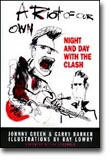

'A Riot of Our Own: Night and Day with the Clash'
by Johnny Green and Gerry Barker
Faber and Faber
Review by Joyce Millman
www.salonmagazine.com
Web posted on: Monday, February 08, 1999 3:38:20 PM
(SALON) -- The Clash's short, glorious career began in the British punk clubs in 1976 and ended in the American arenas in 1982. Along the way, the Clash -- the first British punk band to break big in the States -- made some of the most vital, intense and political rock 'n' roll ever heard. Decked out in their Sandinista rebel gear, mixing up reggae rhythms with a good old-fashioned rock backbeat, quoting Marx and Bo Diddley in equal measure, the band reigned, for a bright shining moment, over the hearts and minds of punk-intellectual-lefty music lovers. In concert, ripping through "I'm So Bored With the USA" and "Clampdown" in full storm-the-barricades mode, they really did make you believe the silly record company hype -- that they were the only band that mattered.
But away from the spotlight, the Clash fell victim to some of the clichés of the trade: drug addiction, internal squabbling, untrustworthy managers. Or so says a former roadie, Johnny Green, the first member of the posse to break the code of silence that has surrounded the group in the 17 years since its breakup. (None of the band members agreed to be interviewed for Marcus Gray's 1996 biography, "Last Gang in Town.") Clash fans will remember Green as the tall guy in studious horn rims who was always bounding onto the stage to adjust the Clash's guitars or to pull excited fans off the lead singer, Joe Strummer. With Garry Barker, a freelance journalist, Green has written an engaging if messy memoir of life at the height of the band's powers, from 1977, just after the release of their first album in England, to 1980, when he quit in exhaustion during an American tour. A bookish punk fan with degrees in Arabic and Islamic studies, Green had been pulled into the Clash's orbit at the comparatively mature age of 27 when they asked him to help work a spotlight at a gig; he ended up as a combination workhorse and nursemaid, hauling their equipment, brewing their tea, scoring their dope and washing out their socks in his hotel-room sink. Since Green admits in the book to being drunk or chemically enhanced throughout much of this period, you may wonder about his reliability as a reporter. The fact that Strummer has written the foreword seems to put a semi-official stamp on Green's version of events. However, it's a version that makes Strummer look very good (an unpretentious, caring anti-star) and makes Mick Jones, the lead guitarist (who lost a power struggle with Strummer and was tossed from the group in 1982) look like a lost member of Spinal Tap. Green depicts Jones as a prissy coke-hound who put on rock-star airs even as he was living with his grandma in a council flat; in one particularly low blow, Green reveals that he was regularly summoned to dye Jones' thinning hair black to make it look fuller.

|
| "London Calling" |
Joyce Millman is a senior editor with Salon Magazine.
All who wander are not lost. Travel with a passion with Salon Magazine's
Wanderlust.
Article contribution by Rita Patel
Articles Page| London's Burning! Home Page
Send questions and comments to: jendave@lycosmail.com